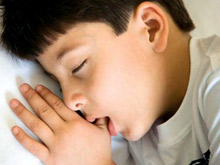Health Topics
-
Healthy Living
-
|
|
November 2009
|
| Thumbsucking: Don't taste the finger |
| Dr Jyotinder Kaur |
| |
 |
Most children suck their thumb or fingers at one time or another. Some even suck their toes, wrists or forearms. But don't worry, young parents – here's help: |
Born With It
Many babies have been known to do thumb-sucking while still in utero (in the uterus) which has been seen in antenatal ultrasonography. Blisters can be seen on the wrists and fingers of newborn babies as a result of intrauterine sucking. Thumb sucking comes naturally to a baby and is not related to any single factor like hunger, emotional insecurity or exploring the body. It is a habit largely observed in the newborn period and at the time of teething. It peaks between 18 and 21months. Most children gradually give up this habit by the time they reach the age of six, before their permanent teeth appear.
The act is also often associated with ear pulling, hair pulling or rubbing the nose with a doll or soft fabric or with sucking the blanket. The thing to remember is that children give up this habit on their own accord. |
Breast Feeding
Breast-fed babies have been found not to thumb suck! This is because their need to suck is already met. The baby suckles as long as it wants - it is the baby that decides when to let go of the nipple. If your baby sucks the thumb, despite your nursing her, maybe you are not giving her enough time. Allow her to suckle for a longer period of time. Usually a baby gets all the milk she needs by suckling at each breast within five to six minutes, but you may allow this to go on till she herself lets go. This may satisfy her and make her give up the thumb-sucking habit.
Bottle Feeding
Thumb sucking develops in the average bottle-fed baby when she does not suck at the bottle for more than 10 minutes. If your baby is bottle-fed and is sucking her thumb, check the bottle to see whether the nipple-hole is too big, making her finish the bottle too fast. Slow down the pace of bottle-feeding; let her take her own sweet time. And yes, do ensure that the hole is not too small to make it difficult for her to get milk at all.
Teething
Very often when a baby starts teething, she may suck her thumb, only to relieve the itchy feeling in the gums that is so common during this period. It is easy to tell the difference between this casual sucking and the habit. If it is just casual, you may notice her chewing on it too. Giving her a teething ring may also help.
Mothers are obsessed by the idea that if their child continues to suck her thumb, she will have protruding teeth. Although it is a fact that thumb sucking can make the baby's front upper teeth come forward and the lower teeth to retreat, this depends very much on how she sucks her thumb and in which position she holds it. This displacement of teeth may also not be permanent. So as long as she gives up the habit before she is six, there is usually no permanent damage to the teeth.
Hunger Pangs
If the baby is hungry, very often she may suck her thumb. Do not get worried if she does it only for a few minutes before meals. But if she does it even after that and also during meals then it is a sure sign that you need to distract her.
May be Psychological
This habit may arise because of insecurity or boredom or sleepiness. You might see it subsiding for a while and returning at the slightest sign of need for some additional comfort, making you feel guilty. Do not worry - if she is occasionally sucking her thumb but is otherwise happy, it is just a habit she will definitely give up.
10 Tips to Help Stop Thumb Sucking
- Keep your cool. Getting hassled about it will only transfer your worries on to your baby making her feel even more insecure.
- Do not pull your baby's thumb out of her mouth every time she puts it in. You might just end up making her more obstinate.
- Do not tie bandages, put bitter pastes, paint bad tasting substances or any of these things - these normally backfire.
- Try to distract her attention by offering her a toy, which she has to probably take with both her hands. If not, you just might see the other thumb going in!
- Distract your child when the thumb goes in, by engaging her in an activity that requires using both hands. Clapping works well.
- Try rewarding her if she does not suck.
- Encourage her to give up the habit in a friendly way.
- Use peer pressure as a powerful motivator: invite your child's friends over who don't suck their thumbs.
- Make the child aware of this habit (without shaming or ridiculing), by having her look in the mirror when she is at it.
- Provide a substitute comfort activity and very importantly, refrain from lecturing or shaming.
|
|
|
 |
Dr. Jyotinder Kaur is Consultant – Paediatrics at Apollo Hospitals, Ahmedabad |
|
|